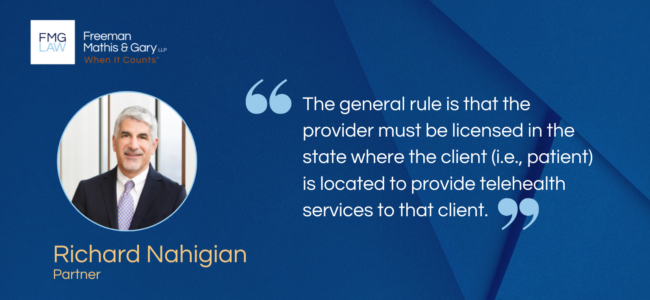BlogLine
Pathways to behavioral telehealth across state lines
12/23/24

While telehealth has become normative among behavioral health providers (e.g., counselors, clinical social workers, and psychologists), uncertainty still exists among some providers about where and how they can practice telehealth across state lines. The general rule is that the provider must be licensed in the state where the client (i.e., patient) is located to provide telehealth services to that client. This has traditionally been the rule in Massachusetts, for example. The general rule is rapidly changing, however, with many states signing on to interstate health (including telehealth) compacts that make it easier for behavioral healthcare providers to practice telehealth across state lines.
While there are many such compacts, the ones that will be of particular interest to behavioral healthcare providers are:
- Counseling Compact https://counselingcompact.org/
The Counseling Compact will allow licensed counselors to practice across state lines by using a home state license to obtain privileges to practice in other member jurisdictions. The Counseling Compact’s application system has not gone live at press time, but it is expected to become operational in 2025.
- Social Work Licensure Compact https://swcompact.org/
The Social Work Licensure Compact provides a path for practitioners to practice in any compact-participating state under a multi-state license, similar to a driver’s license. The license issued by the provider’s home state is used to obtain privileges in any member state. Participating states will align their licensing requirements with compact requirements. Alternatively, a participating state can offer both a single-state license and a multi-state license that comports with compact requirements.
- PSYPACT® https://psypact.gov/
PSYPACT® (the Psychology Interjurisdictional Compact) enables eligible licensed psychologists to practice telehealth and temporary in-person psychology outside the provider’s state without full licensure in the client’s state. The Compact Commission reviews each professional’s credentials. PSYPACT®’s data collection and access systems are more advanced than the other behavioral health compacts (which were still works in progress at press time). Interested providers should be aware that PSYPACT has developed a publicly accessible registry for verifying a psychologist’s compact privileges.
Providers can access the Compacts’ websites by using the links reproduced above. Each website will contain a map depicting which states have joined or are in the process of joining the compact. If you are licensed in a non-participating state, beware. You should consult your local licensing authority as well as the licensing authority of your client’s state to determine whether you can practice telehealth across state lines. Remember, the default is that you must be licensed in the state where your client is located absent compact participation or other special circumstances that may apply on a state-by-state basis. Again, consult the licensing authority for your client’s state.
For now, Massachusetts has not joined any of the compacts. Approaches vary, depending on which licensing board has issued your license. For example, legislation has been introduced that would permit participation in PSYPACT®, while, on the other hand, the board that licenses Massachusetts social workers has expressed concern about telehealth, instructing its counsel at one of its recent meetings in 2024 to study the matter and report back to the board. Among the concerns raised was a lack of proper supervision where required. Continuity of care and identification of risk were also identified as persistent telehealth problems. All behavioral health providers, not just clinical social workers, should take note of these concerns when developing telehealth protocols, strategies, and treatment plans.
For more information, please contact Richard L. Nahigian at richard.nahigian@fmglaw.com or your local FMG attorney.
Share
Save Print
